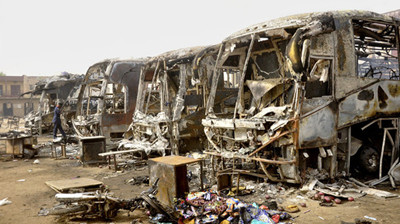Nigeria

An increasingly bloody insurgency waged by Boko Haram, an Islamist terrorist group, has sharpened frustration over the disparity between the jobless north and the oil-rich south. In recent months Kano has been relatively stable, following a military offensive to contain the terrorists. But though the pause in violence has brought people back onto the streets, they have rediscovered other problems. “Stoves are gone, people selling beer have gone, there is no market, there are few customers and I haven't been able to save any money in months,” says Chineu Abason, sitting in her wooden-shack restaurant in Sabon Gari, a mainly Christian district, where Boko Haram bombs have killed scores of people this year (see picture above).
譯文屬譯生譯世











